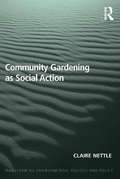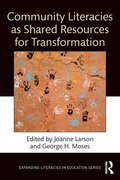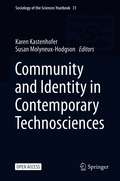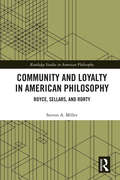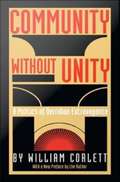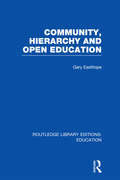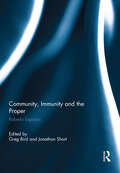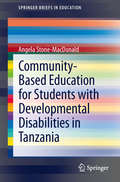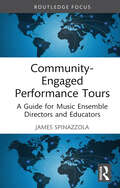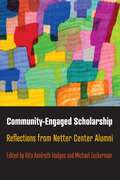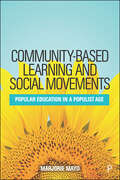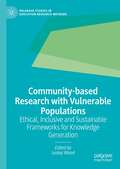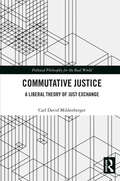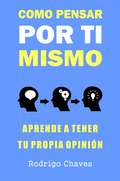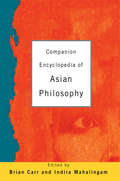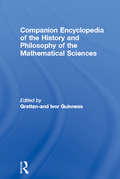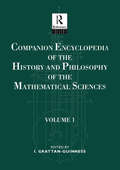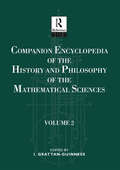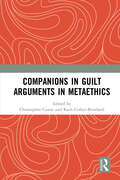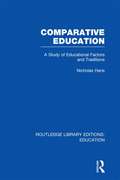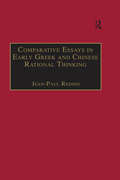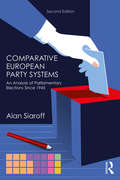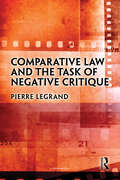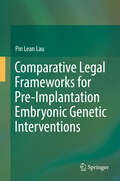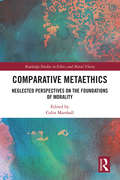- Table View
- List View
Community Gardening as Social Action (Transforming Environmental Politics and Policy #2)
by Claire NettleThere has been a resurgence of community gardening over the past decade with a wide range of actors seeking to get involved, from health agencies aiming to increase fruit and vegetable consumption to radical social movements searching for symbols of non-capitalist ways of relating and occupying space. Community gardens have become a focal point for local activism in which people are working to contribute to food security, question the erosion of public space, conserve and improve urban environments, develop technologies of sustainable food production, foster community engagement and create neighbourhood solidarity. Drawing on in-depth case studies and social movement theory, Claire Nettle provides a new empirical and theoretical understanding of community gardening as a site of collective social action. This provides not only a more nuanced and complete understanding of community gardening, but also highlights its potential challenges to notions of activism, community, democracy and culture.
Community Literacies as Shared Resources for Transformation (Expanding Literacies in Education)
by Joanne Larson George H. MosesThrough multiple narratives reflecting the complexity of participatory action research partnerships for social justice, this book sheds light on the dialogic spaces that intentionally support community literacies and rhetorical practices for inquiry and change. Applying literacy as social practice, Larson and Moses tell a story of a unique collaboration between community members and university faculty and students, who together transformed an urban corner store into a cornerstone of the community. Building on the emerging field of community literacies, the book captures the group’s active work on the ground and, on another level, how transformation occurred in the dialogic spaces of the research team as it learned to embrace distributed expertise and multiple identities.
Community and Identity in Contemporary Technosciences (Sociology of the Sciences Yearbook #31)
by Karen Kastenhofer Susan Molyneux-HodgsonThis open access edited book provides new thinking on scientific identity formation. It thoroughly interrogates the concepts of community and identity, including both historical and contemporaneous analyses of several scientific fields. Chapters examine whether, and how, today’s scientific identities and communities are subject to fundamental changes, reacting to tangible shifts in research funding as well as more intangible transformations in our society’s understanding and expectations of technoscience. In so doing, this book reinvigorates the concept of scientific community. Readers will discover empirical analyses of newly emerging fields such as synthetic biology, systems biology and nanotechnology, and accounts of the evolution of theoretical conceptions of scientific identity and community. With inspiring examples of technoscientific identity work and community constellations, along with thought-provoking hypotheses and discussion, the work has a broad appeal. Those involved in science governance will benefit particularly from this book, and it has much to offer those in scholarly fields including sociology of science, science studies, philosophy of science and history of science, as well as teachers of science and scientists themselves.
Community and Loyalty in American Philosophy: Royce, Sellars, and Rorty (Routledge Studies in American Philosophy)
by Steven A. MillerAmerican pragmatism has always had at its heart a focus on questions of communities and ethics. This book explores the interrelated work of three thinkers influenced by the pragmatist tradition: Josiah Royce, Wilfrid Sellars, and Richard Rorty. These thinkers’ work spanned the range of twentieth-century philosophy, both historically and conceptually, but all had common concerns about how morality functions and what we can hope for in our interactions with others. Steven Miller argues that Royce, Sellars, and Rorty form a traditional line of inheritance, with the thought of each developing upon the best insights of the ones prior. Furthermore, he shows how three divergent views about the function, possibilities, and limits of moral community coalesce into a key narrative about how best we can work with and for other people, as we strive to come to think of widely different others as somehow being morally considerable as "one of us."
Community without Unity: A Politics of Derridian Extravagance
by William CorlettWinner of the 1990 Foundations of Political Theory Section of the American Political Science Association "First Book Award" Now available in paperback with a new preface by the author, this award-winning book breaks new ground by challenging traditional concepts of community in political theory. William Corlett brings the diverse (and sometimes contradictory) work of Foucault and Derrida to bear on the thought of Pocock, Burke, Lincoln, and McIntyre, among others, to move beyond the conventional dichotomy of "individual vs. community," arguing instead that community is best advanced within a politics of difference.
Community, Hierarchy and Open Education (Routledge Library Editions: Education)
by Gary EasthopeThe book describes the English school, especially the secondary school, as a hierarchical community in which the head-teacher (principal) is an autocratic ruler. After explaining how that particular organisation of the school developed historically from the market situation faced by the English public (i.e. private) schools in the developing industrial society of the nineteenth century it provides empirical evidence demonstrating that the hierarchies of knowledge, teachers and students that developed then were still in place when the book was published in 1975. They are still present today. It also looks at the challenges to the school as a hierarchical community presented by the ideologies of deschooling, progressive education and open education. Finally, it provides an explanation of why these ideologies were never put into practice in English schools despite some pioneering exemplars. Although first published over thirty-five years ago the issues examined in it raise questions that are still central to education today: Does size of school affect the commitment of teachers to the school, their colleagues and their students? How can the teaching staff be organised in a school? Do all need to work to the same ends? What is the role of leadership from the head-teacher (principal) in this? Is it possible to have a curriculum that is open without losing rigour? What should be the relationship between using local community knowledge and the educational wish to extend students’ horizons? The result is a short, nuanced, and densely argued text that demands thought and reflection from any contemporary educator.
Community, Immunity and the Proper: Roberto Esposito (Angelaki: New Work in the Theoretical Humanities)
by Greg Bird and Jonathan ShortIt is widely apparent in our hyper-globalized world that the epistemologies, institutions, and practices underwriting it have reached a state of profound crisis. In the globalized world, everything is inevitably brought into proximity and correlation. Wars, natural disasters, climatic upheaval, nor political and economic turmoil, none of these can be effectively isolated, insulated, instituted, even immunized, as something apart, something that might be considered proper only to itself. This collected edition considers this crisis of the proper with a focus on Italian political theorist Roberto Esposito’s work on community, immunity, and biopolitics. This collection introduces Esposito’s work to a wider English-speaking audience and provides many important contributions to the burgeoning scholarship on his political theory. Important international scholars working in this area examine and analyze his theory from a variety of perspectives, including those of biopolitics, feminism, political theory, the history of philosophy (Spinoza, Hegel, Heidegger, and Jean-Luc Nancy), property, community, and gift economies. The collection also includes previously untranslated essays by Esposito and Jean-Luc Nancy. This collection will be of interest to those just discovering Esposito and for those who are already familiar with his work. This book was originally published as a Special Issue of Angelaki: Journal of the Theoretical Humanities.
Community-Based Education for Students with Developmental Disabilities in Tanzania (SpringerBriefs in Education)
by Angela Stone-MacdonaldBased on a yearlong ethnographic study, this book describes the daily life and work of the Irente Rainbow School, a special education school for students with developmental disabilities in Lushoto, Tanzania. It examines the use of local context, community funds of knowledge, culturally relevant pedagogy, and community support to teach students with disabilities important life skills, independence, self-advocacy and to fight for their human rights. This book offers several lessons for different audiences; it is a primer on disability and education in a rural African town, an alternative model for non-governmental agencies to consider in designing community-based and community-engaged programs, and a story about an exceptional group of teachers, students and families who took action to provide an education and a realization of rights for children with disabilities.
Community-Engaged Performance Tours: A Guide for Music Ensemble Directors and Educators
by James SpinazzolaCommunity-Engaged Performance Tours addresses the role of performance touring as a form of classroom and community engagement. Performance tours have long been a part of the collegiate and high school music ensemble experience, bringing student bands, choirs, and orchestras into connection with a wide variety of audiences, venues, and cultural contexts. This book presents a new approach to the performance tour that integrates touring with community engagement and service-learning. Emphasizing reciprocity, cross-cultural exchange, and global awareness, the author addresses how visiting ensembles can work with host communities instead of performing for them. The book includes student and community perspectives and case studies from the author’s experience leading university wind symphony tours in Haiti and the Dominican Republic, and provides a practical and hands-on model for ensemble leaders and educators.
Community-Engaged Scholarship: Reflections from Netter Center Alumni
by Rita Axelroth Hodges and Michael ZuckermanA collection of stories by Penn alumni whose lives were transformed by engaging with the West Philadelphia communityFor over thirty years, the Barbara and Edward Netter Center for Community Partnerships has served as the University of Pennsylvania’s primary vehicle for advancing civic and community engagement at Penn. The Netter Center develops and helps implement democratic, mutually transformative, place-based partnerships between Penn and its local geographic community of West Philadelphia. These partnerships advance research, teaching, learning, and service while improving the quality of life and learning in the community. One of the Netter Center’s primary objectives has been to educate Penn students to be creative, compassionate, ethical citizens who contribute significantly to improving the welfare of others—while they are students and throughout their lives and careers.Community-Engaged Scholarship is a collection of stories told by alumni of the University of Pennsylvania whose lives were profoundly shaped by engaging with the West Philadelphia community as students. Their reflections trace the linear relationship between their involvement in democratic community partnerships through Penn’s Netter Center and their current professional activities, primarily in academia, where they remain actively engaged in the struggle to build a more democratic and equitable society. The mutuality and humility that pervade these autobiographical accounts are the core of the democratic aspiration to which the Netter Center is and has always been dedicated. The stories are testimony to the Netter Center’s and founding director Ira Harkavy’s enduring influence on the next generation of community-engaged scholars and practitioners.Contributors: H. Samy Alim, Jeff Camarillo, Christina Cantrill, Tamara Dubowitz, Bernice Garnett, Rita Axelroth Hodges, John L. Jackson Jr., Jacqueline Kraemer, David Park, Jiyoung Park, Wendell Pritchett, Eric Schwartz, Margo Shea, Salamishah Tillet, Kim Van Naarden Braun, Michael Vazquez, Jason Yip, Andrew Zitcer, Michael W. Zuckerman.
Community-based Learning and Social Movements: Popular Education in a Populist Age
by Marjorie MayoThe rise of Far Right populism poses major challenges for communities, exacerbating divisions, hate speech and hate crime. This book shows how communities and social justice movements can effectively tackle these issues, working together to mitigate their underlying causes and more immediate manifestations. Showing that community-based learning is integral to the development of strategies to promote more hopeful rather than more hateful futures, Mayo demonstrates how, through popular education and participatory action research, communities can develop their own understandings of their problems. Using case studies that illustrate education approaches in practice, she shows how communities can engineer democratic forms of social change.
Community-based Research with Vulnerable Populations: Ethical, Inclusive and Sustainable Frameworks for Knowledge Generation (Palgrave Studies in Education Research Methods)
by Lesley WoodThis book advocates for community-based research with vulnerable populations within the field of higher education. The chapters outline how research can democratize knowledge generation to make it more accessible and socially relevant, and emphasizes the value of the lived and experiential knowledge of vulnerable and marginalized populations. Rooted in a critique of the current practices of higher education that fail to support participatory and transformative research, the research is structured at micro, macro and meso levels to ultimately emancipate colonized thinking of stakeholders about power, privilege and participation. Focusing primarily on various contexts within the Global South, the contributors argue that the time is ripe for community-based research which combines the theoretical knowledge of the academy with the local, experiential knowledge of those experiencing the consequences of social inequality to co-construct knowledge for change.
Commutative Justice: A Liberal Theory of Just Exchanges (Political Philosophy for the Real World)
by Carl David MildenbergerThis book develops a liberal theory of justice in exchange. It identifies the conditions that market exchanges need to fulfill to be just. It also addresses head-on a consequentialist challenge to existing theories of exchange, namely that, in light of new harms faced at the global level, we need to consider the combined consequences of millions of market exchanges to reach a final judgment about whether some individual exchange is just. The author argues that, even if we accept this challenge, the effect of it is minimal. For different reasons, normatively problematic collective market outcomes like externalities, monopolies, violations of the Lockean proviso, inequality, and commodification do not pose particular problems to the justice of market exchanges. He outlines the various conditions a market exchange needs to fulfill to be considered just from a liberal background and in light of the new harms. Ultimately, he shows, it is not the market which is to blame; if we want to tackle issues like global warming or global economic injustice, we should not blindly follow the intuition that we best restrain and regulate markets. Commutative Justice is unique in its focus on justice in exchange rather than on end-state distributive justice, and the way in which it addresses the new harms we are facing today. It will be of interest to researchers and advanced students in philosophy, politics, and economics who are working on questions of economic justice.
Como pensar por ti mismo: Aprende a tener tu propia opinión
by Rodrigo ChavesPuede que no te des cuenta, pero todo lo que piensas ha sido determinado por otra persona. Tus creencias y convicciones no te pertenecen, fueron dictadas y las copiaste. Si realmente quieres ser dueño de tus pensamientos, lee esta guía.
Companion Encyclopedia of Asian Philosophy (Routledge Companion Encyclopaedias Ser.)
by Brian Carr Indira MahalingamThe Companion Encyclopedia of Asian Philosophy is a unique one-volume reference work which makes a broad range of richly varied philosophical, ethical and theological traditions accessible to a wide audience.The Companion is divided into six sections covering the main traditions within Asian thought: Persian; Indian; Buddhist; Chinese; Japanese; and Islamic philosophy. Each section contains a collection of chapters which provide comprehensive coverage of the origins of the tradition, its approaches to, for example, logic and languages, and to questions of morals and society. The chapters also contain useful histories of the lives of the key influential thinkers, as well as a thorough analysis of the current trends.
Companion Encyclopedia of the History and Philosophy of the Mathematical Sciences (Routledge Companion Encyclopedias)
by I. Grattan-Guinness* Examines the history and philosophy of the mathematical sciences in a cultural context, tracing their evolution from ancient times up to the twentieth century * 176 articles contributed by authors of 18 nationalities* Chronological table of main events in the development of mathematics* Fully integrated index of people, events and topics* Annotated bibliographies of both classic and contemporary sources* Unique coverage of Ancient and non-Western traditions of mathematics
Companion Encyclopedia of the History and Philosophy of the Mathematical Sciences: Volume One
by I. Grattan-GuinnessFirst published in 2004. Routledge is an imprint of Taylor & Francis, an informa company.
Companion Encyclopedia of the History and Philosophy of the Mathematical Sciences: Volume Two
by I. Grattan-GuinnessFirst published in 2004. This book examines the history and philosophy of the mathematical sciences in a cultural context, tracing their evolution from ancient times up to the twentieth century. Includes 176 articles contributed by authors of 18 nationalities. With a chronological table of main events in the development of mathematics. Has a fully integrated index of people, events and topics; as well as annotated bibliographies of both classic and contemporary sources and provide unique coverage of Ancient and non-Western traditions of mathematics. Presented in Two Volumes.
Companions in Guilt Arguments in Metaethics: Arguments in Metaethics
by Christopher Cowie Rach Cosker-RowlandComparisons between morality and other ‘companion’ disciplines – such as mathematics, religion, or aesthetics – are commonly used in philosophy, often in the context of arguing for the objectivity of morality. This is known as the ‘companions in guilt’ strategy. It has been the subject of much debate in contemporary ethics and metaethics. This volume, the first full length examination of companions in guilt arguments, comprises an introduction by the editors and a dozen new chapters by leading authors in the field. They examine the methodology of companions in guilt arguments and their use in responding to the moral error theory, as well as specific arguments that take mathematics, epistemic norms, or aesthetics as a ‘companion’, and the use of the companions in guilt strategy to vindicate claims to moral knowledge. Companions in Guilt Arguments in Metaethics is essential reading for advanced students and researchers working in moral theory and metaethics, as well as those in epistemology and philosophy of mathematics concerned with the intersection of these subjects with ethics.
Comparative Education: A Study of Educational Factors and Traditions (Routledge Library Editions: Education)
by Nicholas HansThis book is divided into four parts. In Part One the author considers the natural factors which have influenced the various national systems of education. They comprise racial, linguistic, geographical and economic factors. In Part Two he considers the contribution of religious traditions to education, more particularly those of the Catholic and Puritan faiths, and in Part Three the secular traditions of humanism, socialism and nationalism. Finally in Part Four a comparison is made of the systems of education in England and Wales, the USA, France and the Soviet Union.
Comparative Essays in Early Greek and Chinese Rational Thinking
by Jean-Paul RedingThis collection of essays, by Reding, in the emergent field of Sino-Hellenic studies, explores the neglected inchoative strains of rational thought in ancient China and compares them to similar themes in ancient Greek thought, right at the beginnings of philosophy in both cultures. Reding develops and defends the bold hypothesis that Greek and Chinese rational thinking are one and the same phenomenon. Rather than stressing the extreme differences between these two cultures - as most other writings on these subjects - Reding looks for the parameters that have to be restored to see the similarities. Reding maintains that philosophy is like an unknown continent discovered simultaneously in both China and Greece, but from different starting-points. The book comprises seven essays moving thematically from conceptual analysis, logic and categories to epistemology and ontology, with an incursion in the field of comparative metaphorology. One of the book's main concerns is a systematic examination of the problem of linguistic relativism through many detailed examples.
Comparative European Party Systems: An Analysis of Parliamentary Elections Since 1945 (Contemporary Issues In European Politics Ser. #Vol. 5)
by Alan SiaroffComparative European Party Systems, Second Edition, provides a comprehensive analysis across 48 party systems of party competition, electoral systems and their effects, and the classification of party systems and governments from 1945 through late-2018. The book consists of three parts. Part I provides a comparative and quantitative overview of party systems according to party families, patterns of party competition, electoral systems and their effects, and classification of party systems and governments. Part II consists of 38 detailed country profiles of longstanding democracies and of the European Union (plus nine profiles on regions such as in Spain and the UK), providing essential detail on the electoral systems, parties, party patterns and systems, dimensions of political competition, and governments. Part III provides an analysis of 10 additional country profiles of oscillating regimes such as Russia, Ukraine, and Balkan and Transcaucasus states. Comparative European Party Systems provides an excellent overview of topical issues in comparative election and party system research and presents a wealth of information and quantitative data. It is a crucial reference for scholars and students of European and comparative politics, elections, electoral systems, and parties and party systems.
Comparative Law and the Task of Negative Critique
by Pierre LegrandThis book’s essays seek to cleanse comparative law of some of the epistemic detritus it has been collecting and that has been cluttering its theory and practice to the point where this flotsam has effectively stultified ‘good’ comparison. While a critique would pursue adjustments to the prevailing model, this text’s negative critique seeks a much more radical refurbishment as it utters an emphatic ‘no’ to the governing epistemology: it pursues, in effect, a deposition and a disposition of the leading epistemic configuration and the various assumptions regarding the acquisition of knowledge about foreign law that inform it. Negative comparative law thus operates at a primordial level inasmuch as it concerns the matter of justice: it aims to do justice to foreign law as foreignness finds itself appropriated and travestied by comparatists for ideological purposes. In the process, negative critique purports significantly to enhance comparative law’s institutional, intellectual, and ethical respectability. This book will benefit all law teachers and postgraduate law students interested in the workings of law on the international scene, whether specialists in comparative law, public international law, private international law, transnational law, or foreign relations law – in particular, individuals bringing to bear a critical inclination to their subject-matter.
Comparative Legal Frameworks for Pre-Implantation Embryonic Genetic Interventions
by Pin Lean LauThis book discusses the possibilities for the use of international human rights law (and specifically, international biomedical laws related to the protection of human rights and the human genome) to provide a guiding framework for the future regulation of genetic modifications applied to human embryos and other precursor materials, when these are made with the aim of implanting a genetically altered embryo in a woman. The significance and timeliness of the work derives from the recent availability of CRISPR/Cas9 and other gene editing tools, and from lacunae in international law regarding the legality of embryo modification with these tools and appropriate governance structures for the oversight of resulting practices. The emergence of improved genome editing tools like CRISPR/Cas9, holds the promise of eradicating genetic diseases in the near future. But its possible future applications with Pre-Implantation Genetic Diagnosis (PGD) raises a plethora of legal and ethical concerns about "remaking" future human beings. The work aims to address an urgent call, to embed these rising concerns about biomedical advancements into the fundamental tailoring of legal systems. Suitable regulatory approaches, coupled with careful reflection of global biomedical laws and individual constitutional systems must be explored. The Book analyzes the impact of reproductive biomedical technologies on the legal and ethical dimensions of regulatory frameworks in selected constitutional systems like the US, the UK, Australia, Malaysia and Thailand. Employing a comparative law methodology, the work reveals a dynamic intersection between legal cultures, socio-philosophical reasoning and the development of a human rights-based framework in bio-political studies. Navigating towards a truly internationalized biomedical approach to emerging technologies, it presents an understanding why a renegotiation and reinvigoration of a contemporary and "new" universal shared values system in the international human rights discourse is now necessary.
Comparative Metaethics: Neglected Perspectives on the Foundations of Morality (Routledge Studies in Ethics and Moral Theory)
by Colin MarshallThis collection of original essays explores metaethical views from outside the mainstream European tradition. The guiding motivation is that important discussions about the ultimate nature of morality can be found far beyond ancient Greece and modern Europe. The volume’s aim is to show how rich the possibilities are for comparative metaethics, and how much these comparisons offer challenges and new perspectives to contemporary analytic metaethics. Representing five continents, the thinkers discussed range from ancient Egyptian, ancient Chinese, and the Mexican (Aztec) cultures to more recent thinkers like Augusto Salazar Bondy, Bimal Krishna Matilal, Nishida Kitarō, and Susan Sontag. The philosophical topics discussed include religious language, moral discovery, moral disagreement, essences’ relation to evaluative facts, metaphysical harmony and moral knowledge, naturalism, moral perception, and quasi-realism. This volume will be of interest to anyone interested in metaethics or comparative philosophy.
